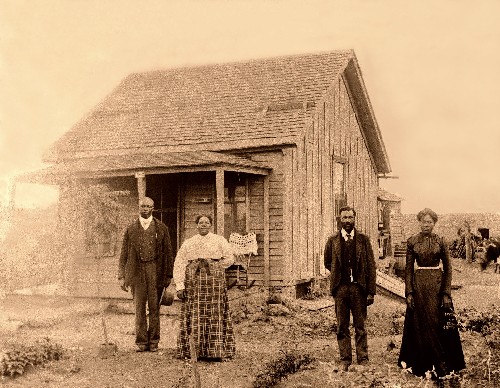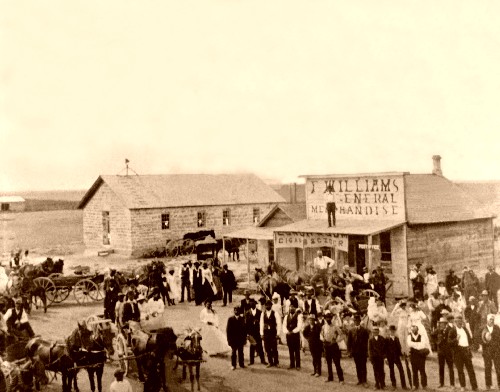
Nicodemus, Kansas
Nicodemus, Kansas had an important role in American History. The town symbolizes the pioneering spirit of African Americans who dared to leave the war torn South to experience true freedom and self government. today, it is the only western town established by African Americans during the Reconstruction period following the Civil War.
The United States Congress, recognizing the importance of Nicodemus' contribution to our Nation's heritage, enacted legislation November 12, 1996, to establish Nicodemus National Historic Site as a unit of the National Park System. This legislation directs the National Park Service to assist the community in the preservation of historic structures and to interpret their history for the benefit of present and future generations. (source: )

Nicodemus, Kansas - A Black Pioneer Town
After the Civil War, freed slaves in the South faced an uncertain future. Economically destitute, they struggled to establish schools and buy their own land. The establishment of the sharecropping system, the rise of the Ku Klux Klan and the entrenchment of segregation made their chances for success remote. When Reconstruction ended, and federal troops withdrew in 1877, Black families began to leave the South by the thousands, looking for a better future. They were called "Exodusters," in reference to the Biblical story of the Israelites escape from Egypt. Excerpts from letters written in 1879 help tell the story of the Exodusters journey to Kansas. Musical clips featured in this podcast are performed by: The Free Staters, Curly Miller and Carole Anne Rose, and Sweet Honey In The Rock.
(http://www.kshs.org/audiotours/kansasmemory/mp3/019_exodusters.mp3)
(http://www.kshs.org/audiotours/kansasmemory/mp3/019_exodusters.mp3)
To listen to the podcast, click here.

Kansas: The Land of Opportunity
Despite these findings, many blacks in Tennessee held fast to the idea of taking up farms in Kansas. Some became renters or sharecroppers, while most simply worked as day laborers for the white population. It was not an advantageous situation, and many eventually abandoned the region. The 1880 federal census lists 90 African American households in Baxter Springs; although there were still 85 black households in 1885, only 38 had been part of the town five years earlier.
Singleton gave his followers the best advice he could and never intentionally led them astray, but adverse economic and social conditions in America overwhelmed him and the black settlers of Cherokee County. Singleton learned some hard lessons from the Baxter Springs experiment and, rather than accept defeat, endeavored to make his subsequent colonists more self-reliant. He also founded the Freedman's Aid Association, which provided important educational opportunities for blacks.
Despite these findings, many blacks in Tennessee held fast to the idea of taking up farms in Kansas. Some became renters or sharecroppers, while most simply worked as day laborers for the white population. It was not an advantageous situation, and many eventually abandoned the region. The 1880 federal census lists 90 African American households in Baxter Springs; although there were still 85 black households in 1885, only 38 had been part of the town five years earlier.
The failure to establish an African American colony in southeastern Kansas did not deter efforts in other parts of the state. In spring of 1878, Singleton redirected his efforts to a part of Kansas where cheaper land was available through the 1862 Homestead Act, and successfully established a colony at Dunlap in Morris County (central Kansas). The famous Nicodemus Colony in Graham County was established in the summer of 1877, and the Hodgeman County Colony was first settled in the spring of 1878.
Singleton’s attempts to form a colony in southeastern Kansas demonstrate the determination of black Americans to break free from the social and economic oppression of the South, and it served as a forerunner to the more worldly-wise Dunlap Colony. Thus it remains an important milestone in African American history. Blacks defied southern stereotypes and risked the only life they knew when they strove to become farmers on the Kansas prairie. Singleton was an inspiration to many who followed.

The flier pictured above announces a public celebration to honor Singleton’s efforts on the date of his 73rd birthday in 1882. It is on display in the main gallery of the Kansas Museum of History. (source: Kansas Hisory)
Early settlers of Nicodemus, Kansas, Henry Williams and Reece Switzer; Copyprint Historic American Building Survey Field Records Prints and Photograph Division (113)s
A good deal of intermarriage took place among the first black colonists of Nicodemus township, including the Fletcher, Williams, and Switzer families. Many of their descendants are still living in the township today. Henry Williams, father of the first black child to be born in Nicodemus, is pictured here with Reece Switzer, another early resident.

Black Migration -- Exoduster Movement. Town site plan for Nicodemus, Kansas, 1877-1890. (Image courtesy of the Library of Congress. Can be found in the Historic American Building Survey Field Records, Prints and Photographs Division (109).)
The Historic American Buildings Survey (HABS) produced a townsite plan of Nicodemus as it existed between 1877 and 1890, with architectural drawings and photographs of forty-two of the buildings. The locations of these buildings are shown on the plan, along with their earliest known year of construction.





But you can also enjoy it through another innovations feature of Playbook.
ReplyDeleteClick "Edit" button to remove the unwanted area like backside, set
brightness, contrast, saturation of Kodak video and apply special effects to your Kodak video.
These efforts are incredibly obvious when it comes to the Playbook's strengths as a traveling device.
Also visit my webpage blackberry playbook
The manufacturer claims if this can improve text
ReplyDeleteentry speeds by 30%. 1 is Samsungs replacement of the original Galaxy
Tab 10. Business travel become less an adventure and more an experience,
this a 7 inch tablet which you can take it anywhere with you.
Also visit my page; samsung galaxy tab 2